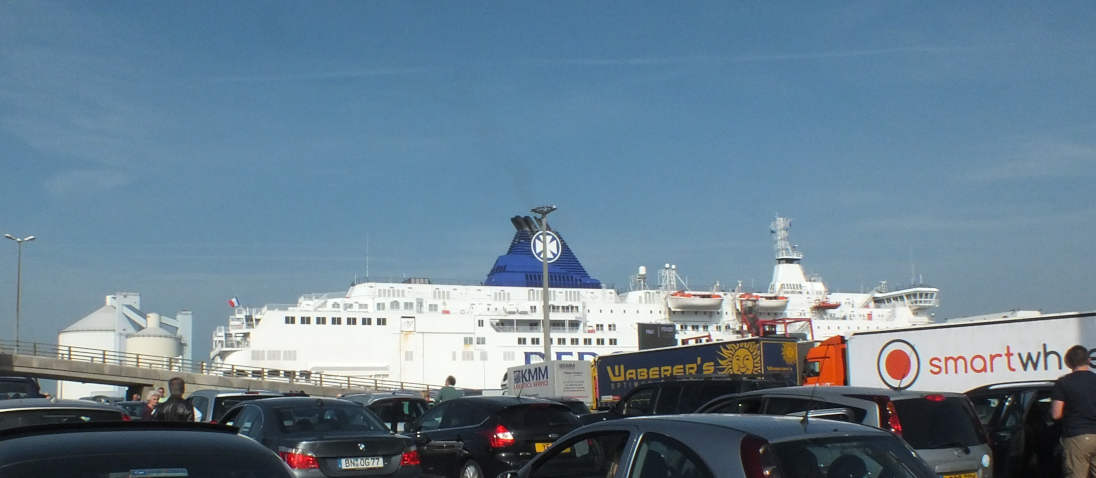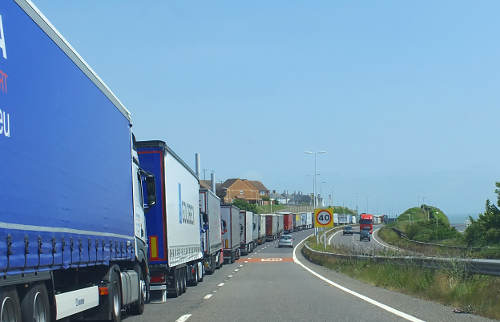
Britain - living with Brexit
Since 2016 Britain has been learning to live in a new world - the world of Brexit
Words highlighted in yellow are in excerice C, synonyms.
In June 2016, in a historic referendum, the United Kingdom narrowly voted to leave the European Union. The process, known as Brexit (a combination of "Britain" and "exit"), was supported by 51.9% of voters, while 48.1% opposed it. After long negotiations between Britain and the EU, Brexit officially took place on 31st January 2020. Many people in Britain believed that this would be the start of a new era in which the UK would "take back control" over its laws, borders, and trade; but since then, the reality of Brexit has turned out to be far more complicated.
The Promise of Freedom
Brexiteers argued that leaving the EU would allow the UK to "get our sovereignty back" and make national decisions without interference from Brussels. They believed that by breaking free from "Brussels red tape", Britain would control immigration, make exciting new trade deals with countries all over the world, and get rid of what they saw as excessive EU rules and bureaucracy.The idea of "Global Britain" was heavily promoted, with the promise that the UK would thrive as an independent, forward-looking trading nation. And in the months after the vote, there was strong belief that Brexit would bring Britain prosperity, new opportunities, and a better National Health Service.
A Complicated Reality

Lots of small firms that depended on fast and simple trade with the EU have gone out of business or had to lay off workers. Farmers, fishermen, and exporters have often complained of delays, losses, and extra costs. In some big industries, like car manufacturing and pharmaceuticals, the added red tape has made the UK a less attractive place to invest.
Brexit has also affected the British workforce. No longer able to recruit employees from the EU, several sectors including hospitality, healthcare, agriculture, and transport have experienced staff shortages. At the same time, British people who used to be able to live and work across the EU now face restrictions and visa requirements. Young people (who voted heavily against Brexit in the Referendum) have been particularly hard hit, with the loss of the Erasmus exchange programme and opportunities to work abroad.
The Human Side
Beyond economics, Brexit has also had a major impact on people’s lives and identities. For some Britons, notably in Scotland or Northern Ireland, Brexit has increased feelings of separation from the rest of the UK. Scotland voted strongly against Brexit, and calls for another independence referendum have grown louder in recent years.For Northern Ireland, which shares a land border with the EU but is separated by sea from the rest of the UK, Brexit has been particularly disruptive. The Northern Ireland Protocol, drawn up between Britain and the EU to avoid a hard border between Northern Ireland and the Republic of Ireland, caused political tensions and practical difficulties for trade within the UK itself.
For many individuals, Brexit has led to a sense of division and uncertainty. Families, friendships, and communities have sometimes been split between "leavers" and "remainers", and even now, years later, the topic can still cause strong emotions.
A New Relationship with Europe
Despite all the challenges, the UK and the EU are now slowly rebuilding a working relationship. In areas like science, security, and climate change, the UK and EU have resumed collaboration. For instance, in 2024 Britain rejoined the Horizon Europe research programme, which had previously been disrupted by Brexit, a step which was welcomed by scientists and universities on both sides of the Channel.While trade remains more difficult than before Brexit, new agreements and efforts to reduce barriers are under discussion, and politicians and business leaders are working to make future cooperation smoother and more efficient, without the UK fully rejoining the EU.
Looking Ahead
Brexit has changed the UK in many ways, politically, economically, and socially; and while some of the promises made before the referendum have been difficult to fulfil, the country is slowly adapting to its new position outside the EU. Recent opinion polls show that a clear majority of people in the UK now believe that Brexit was a big mistake, and are in favour of a new referendum. A Deltapoll survey in May 2024 even suggested that 89% of "Gen Z" (young people born between 1997 and 2012) would vote for the UK to rejoin the EU if there were another referendum.However talk of a new referendum is premature; while many in his party would welcome a chance to vote for the UK to rejoin the EU, Prime Minister Keir Starmer is not going to go that far - or at least, not in the foreseeable future. Parts of the British media and forces on the right wing of British politics, who strongly supported the first Brexit referendum, still have considerable influence over life and opinion in the UK, and as long as their influence remains strong, a new referendum remains a risky undertaking. It will come, one day.... but not just yet.
For now, Britain and the EU will continue to focus on practical cooperation that reflects the new realities of today rather than the hopes or fears of the past.
GENERAL WORD GUIDE:
Brussels: the name of the city is used to imply the European Union - deals: contracts - paperwork: forms to be filled in, letters - workforce: employees - hospitality: the hotel and accommodation industry - requirements: obligations - resume: start again - polls: opinion surveys - undertaking: job, taskPrinting: Optimized for printing
Copyright © Linguapress 2025.
Copying permitted for personal study, or by teachers for use with their students
LINGUAPRESS ADVANCED ENGLISH - STUDENT WORKSHEET
Britain - living with Brexit:
A. Words and meaning
Here are ten words and expressions (1 to 10) used in the
article. Match each word or expression with one of the ten
definitions ( a to j) listed below. Write the word or
expression into the box before the definition.
b. The condition of having successful economic conditions or wealth.
c. A situation where there are not enough workers to fill all the jobs available .
d. Complicated official rules and procedures that are seen as unnecessary or frustrating.
e. Variation in laws and standards that make coordination or trade between countries more difficult.
f. The right of a country or people to govern itself without outside interference.
g. Excessive or rigid administrative procedures that delay or complicate decision-making.
h. Causing serious change or interruption to normal order or function.
i. A formal agreement or system of rules for conduct, especially between states.
j. Occurring before something is ready or before the appropriate time..
B. True / False / Not Given – Comprehension Questions
Read each statement
carefully and decide whether it is True, False, or Not Given, based on
the information in the text. Type your choice into the box
- The UK officially left the European Union in January 2020.
- One of the reasons people supported Brexit was to reduce the influence of the US on British politics.
- Since Brexit, trade with the EU has become more difficult for many British businesses.
- Young voters were mostly in favour of leaving the EU in the 2016 referendum.
- The Northern Ireland Protocol was designed to avoid a hard border between Northern Ireland and the Republic of Ireland.
- Prime Minister Keir Starmer has announced a date for a second referendum on EU membership.
- The text says that Brexit has increased political unity within the United Kingdom.
- Some scientific collaborations between the UK and EU have resumed after earlier disruption due to Brexit.
Select the nearest alternative or synonym for the following words that occurred in the article:
trade
thrive
lay off
delays
recruit
tensions
split
communities
agreements
D. Listening
Pick out eight small differences between the written and the audio version of this article.
You will hear the following words in the audio text:
Beginning / complex / relied / farming / deep / example / status / the time being.
What words are used in their place in the written text?
For teachers
Answers to true/false/not given exercise. 1T, 2NG there is no mention of the USA in the article), 3T, 4F, 5T, 6 F, 7NG (though F by implication), 8T
© linguapress.com



 Copyright
information.
Copyright
information.